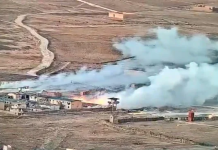KABUL, MAY 28: A senior commander of the Afghan Taliban has issued a stern warning to militant factions operating under the banner of Tehreek-e-Taliban Pakistan (TTP) – also referred to as Khawarij -cautioning them against engaging in violent activities in Pakistan without the explicit approval of the Islamic Emirate’s leadership.
Addressing a police passing-out ceremony, Saeedullah Saeed, a senior figure within the Taliban ranks, said that jihad can only be declared by the Amir (supreme leader) of an Islamic state and not by individuals or groups acting independently.
“Fighting in any country, including Pakistan, without the command of the Amir is against Shariah and considered fasad (corruption), not legitimate jihad,” Saeed said. He added that those who launch operations across borders based on group loyalty or personal motivations are defying Islamic principles as well as the authority of the Afghan leadership.
“Joining different factions and carrying out jihad abroad does not make one a true mujahid,” he asserted. “Such actions are rooted in ego and factionalism, not religious duty.”
بریکنگ
افغان طالبان نے فتنتہ الخوارج کو انتباہ جاری کر دیا
افغان طالبان کے کمانڈر سعیداللہ سعید کا پولیس اہلکاروں کی پاسنگ آؤٹ تقریب سے خطاب
کمانڈر سعیداللہ سعید نے اپنے خطاب میں فتنتہ الخوارج کو تنبیہ کرتے ہوئے کہا کہ؛
“امیر کے حکم کے خلاف کسی بھی ملک خصوصاً پاکستان میں… pic.twitter.com/eiWhfNo7i3— PTV News (@PTVNewsOfficial) May 28, 2025
The commander further clarified that the Islamic Emirate of Afghanistan has prohibited any unauthorized movement across the Pakistan-Afghanistan border, stressing that such actions amount to disobedience of the Emirate’s leadership.
Saeed’s remarks come amid growing concerns over cross-border militancy and increased attacks inside Pakistan, many of which have been linked to groups affiliated with the banned Tehreek-i-Taliban Pakistan (TTP), some of whose factions are believed to operate from Afghan soil.
Security analysts in Pakistan have welcomed the statement, viewing it as a potential step towards curbing militant activities along the porous border. Experts say the Taliban’s official stance lends weight to Pakistan’s narrative on counterterrorism, particularly in highlighting the distinction between legitimate resistance and terrorism masked as jihad.
“This statement strengthens Pakistan’s internal security narrative, helps isolate non-state actors engaged in violence, and supports Islamabad’s diplomatic position internationally,” a senior defense analyst told Dawn on the condition of anonymity.
The commander’s warning also alluded to the involvement of foreign-backed groups in destabilizing the region. Analysts point out that factions operating under the Khawarij label, often referred to as Indian proxies by Pakistani officials, are attempting to justify their militant actions under religious pretexts — a tactic Saeed explicitly rejected.
The use of the term Khawarij — historically used to denote rebels who deviate from mainstream Islamic teachings — has often been employed by the Afghan Taliban and Pakistani officials alike to delegitimise militant factions operating outside state authority.
Saeed’s remarks are being seen as an affirmation of the Taliban’s evolving stance towards regional militancy, especially in the context of their own governance challenges and international isolation.
The Afghan Taliban’s position on cross-border militancy remains under close observation as Islamabad continues to press Kabul to take stronger action against groups that target Pakistan from Afghan territory.
While Kabul has repeatedly denied hosting militants who threaten neighbouring countries, statements like those made by Saeed indicate a growing recognition within the Afghan Taliban of the need to assert control over rogue elements.

















